Jun 3, 2025 11:25 AM
In Memoriam: Al Foster, 1943–2025
Al Foster, a drummer regarded for his fluency across the bebop, post-bop and funk/fusion lineages of jazz, died May 28…
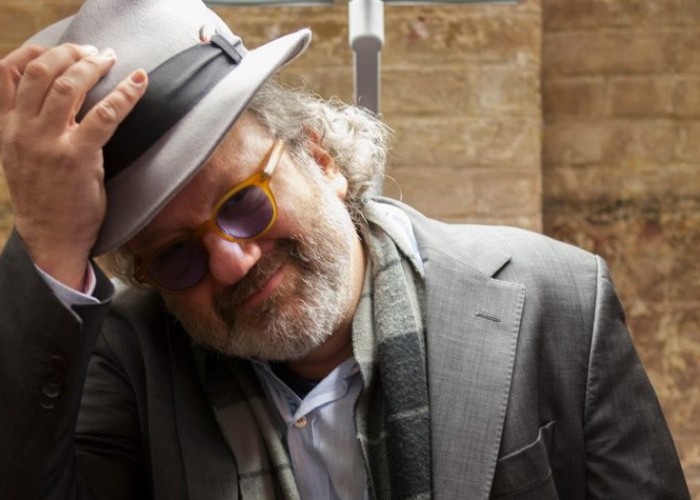
Hal Willner (1956–2020)
(Photo: Courtesy Roulette)They came to salute Nino Rota, but in the end they delivered a gift to a dear friend. True, the iconic Italian composer, long associated with the equally iconic Italian director Frederico Fellini, received a tip of the hat that will forever be fondly recalled; the 26-member ensemble performing Hal Willner’s Amarcord Nino Rota at Brooklyn’s Roulette on April 8 keenly expounded on the movie maestro’s work, as did its prototype, the acclaimed 1981 various-artists album of the same name. Yet it was the insightful music producer who seemed most present in the room. We lost Willner in March of 2020, a 64-year-old victim of COVID in the pandemic’s first weeks. The packed house was unmistakably teeming with love for its fallen hero. When arranger Steve Weisberg took the stage at the start of the show sporting a blazer, fedora, jeans and ponytail, he turned to the audience, opened his coat and revealed a homemade T-shirt beneath: H-A-L in huge letters. The evening had begun.
Happily, the show’s kick-off boasted a mischieveous vibe, paralleling one of Willner’s bedrock temperaments. The orchestra members tuned up with wry grins on their faces, playful improvisers perhaps imagining themselves in formal stage garb, teasing the typical solemnity of concert decorum before bringing a puckish demeanor to the pieces at hand. Weisberg was the first of a conducting squad that included Steven Bernstein and Giancarlo Vulcano, and his gleeful approach to the evening’s opening salvo of La Strada motifs synopsized the rich terrain that lay ahead. He punctuated one rhythmic shift with a perfectly timed blast from a plastic extendo party whistle.
Part of the brilliance of Rota’s work is its balance of merriment and melancholy, an emotional posture that often milks each element to settle on a sort of hearty wistfulness. “How can we be happy amid the unhappiness of others?” the composer once queried. It’s a beguiling combo, and nods to both sides of its equation made the extended program (three hours with an intermission — several pieces not on the original album were essayed) pop with a variety of moods.
The eerie side of things certainly got its due. Throughout the evening Rob Schwimmer’s rather masterful theremin work added a mysterious tenor to a clutch of pieces. Controlling the pitch with his hands, this oddball instrument generated spectral siren songs that enhanced the band’s twists and turns. In the guitar realm, Gary Lucas reminded us just how ghostly his strings can be with a solo acoustic “Giton’s Theme” as prelude to a Satyricon melange. In three short minutes he conjured both Skip James and the ominous sensuality of Fellini’s 1969 masterpiece.
Bill Frisell’s “Juliet Of The Spirits” from the ’81 album (now out of print but available digitally on Corbett vs Dempsy’s Bandcamp page) was not only a gem built on nuance after nuance, but the guitarist’s first recorded work. At Roulette, he negotiated a newish Michael Gibbs arrangement that thickened the original’s personality but left plenty of room for gossamer improvs, each forlorn line forming a silky cobweb kept afloat by drummer Kenny Wollesen’s brushes. Frisell also duetted with Laurie Anderson, the electronically enhanced strings of her violin mixing with his improvised Tele feathering as she shared a poem from Willner-fave Shel Silverstein. With an air of loss in the room already, her measured whispers through “Where The Sidewalk Ends” took on an existential inflection that likely wasn’t lost on the aging boomer audience.
Of course there was no lack of frolic during the two sets. Rota’s dizzy marches, circus references and swinging passages provided room for several extended romps from the orchestra’s improvisers. A cornerstone of the original album, Carla Bley’s 12-minute escapade through the composer’s 8½ score was the kind of whirlwind that buoyed the record’s more somber moments. With her daughter Karen Mantler on xylophone, the band hopped on the exquisitely explosive arrangement and galloped away. This is a good point to mention that the group must have accomplished a lot in rehearsals. The robust sweeps through the uptempo pieces enjoyed full coordination, opening doors for all sorts of curt soloist outbreaks. Reed players Brian Settles and Doug Weiselman both got some house, and Marty Ehrlich raised the roof with an alto dispatch that ceaselessy contoured until reaching a nexus of form and expression.
“You build a strong framework, and you let people do what they do inside the framework,” Willner once said about curating his so-called concept albums. Giving musicians an artistic green-light was always part of the formula, à la Robert Altman and his actors. Bernstein certainly got plenty of room to maneuver with his update of “Roma,” which went from the original Steve Lacy soliloquy to a design of kaleidoscopic episodes that fused melodies while dodging clutter — super catchy, and an evening standout. “Hal was the greatest listener ever,” Bernstein said from the stage, indicating that his longtime pal emphasized a fully focused way of approaching art.
Willner once explained this project was conceived in the late ’70s, when he was a 24-year-old NYC cab driver; it was meant to have a Sketches Of Rota vibe, and feature saxophonist John Gilmore. He credits “instinct, not experience” for whatever kudos were garnered by his blend of affiliation and juxtaposition that defined the template, which went on to include homages to Weill, Disney, Monk and others.
Part of the Brooklyn victory is the fact that it assuaged the cancellation of the show’s 2018 Lincoln Center Out of Doors staging. Moments before the first note, lightning storms put the kibosh on the event. Three years and one day after his passing, the producer’s jazz valentine to Rota bloomed anew at Roulette’s U.S. premiere, and that wistfulness mentioned above wafted through the room during pianist Schwimmer’s poignant “La Strada” closer, the woman next to me actually tearing up a bit. Amarcord Hal Willner. DB
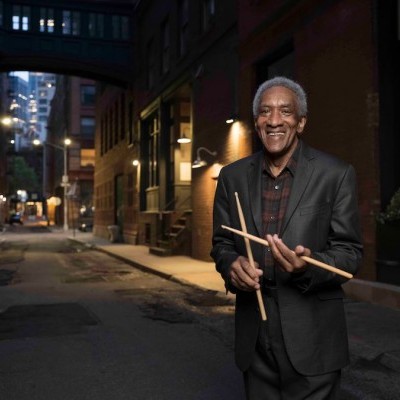
Foster was truly a drummer to the stars, including Miles Davis, Sonny Rollins and Joe Henderson.
Jun 3, 2025 11:25 AM
Al Foster, a drummer regarded for his fluency across the bebop, post-bop and funk/fusion lineages of jazz, died May 28…
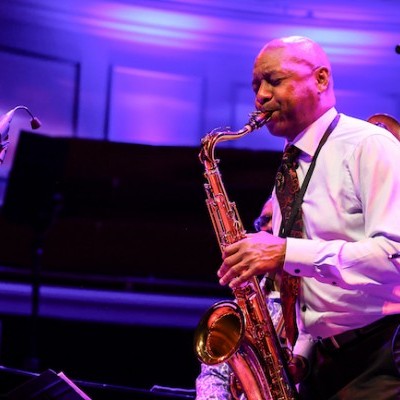
“Branford’s playing has steadily improved,” says younger brother Wynton Marsalis. “He’s just gotten more and more serious.”
May 20, 2025 11:58 AM
Branford Marsalis was on the road again. Coffee cup in hand, the saxophonist — sporting a gray hoodie and a look of…
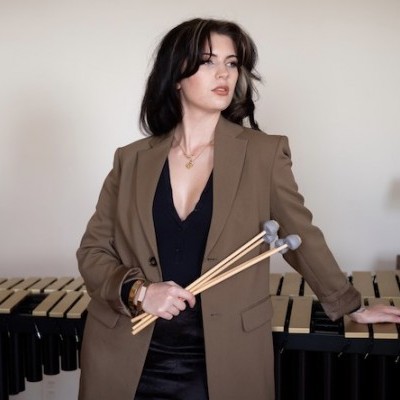
“What did I want more of when I was this age?” Sasha Berliner asks when she’s in her teaching mode.
May 13, 2025 12:39 PM
Part of the jazz vibraphone conversation since her late teens, Sasha Berliner has long come across as a fully formed…

Roscoe Mitchell will receive a Lifetime Achievement award at this year’s Vision Festival.
May 27, 2025 6:21 PM
Arts for Art has announced the full lineup for the 2025 Vision Festival, which will run June 2–7 at Roulette…
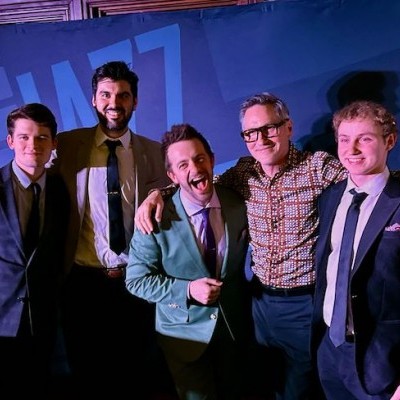
Benny Benack III and his quartet took the Midwest Jazz Collective’s route for a test run this spring.
Jun 3, 2025 10:31 AM
The time and labor required to tour is, for many musicians, daunting at best and prohibitive at worst. It’s hardly…